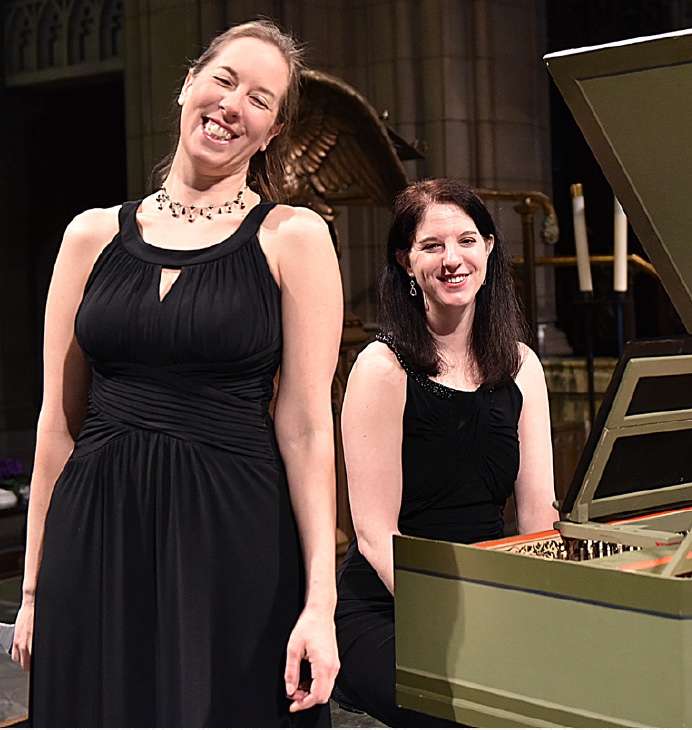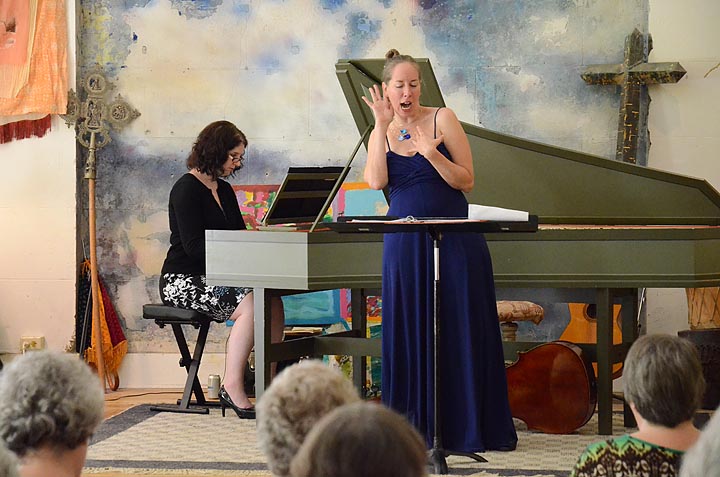by Mike Telin

In the past year, soprano Malina Rauschenfels and harpsichordist Paula Maust have presented “Suppressed Voices: Music of the Banished” which featured music by Johann Rosenmüller — a German who escaped to Italy after being imprisoned for homosexuality — and Peter Philips, who was imprisoned as a Catholic in Anglican England, then later fled to the Spanish Netherlands. “Destructive Desires” examined works by Couperin, Rameau, Jacquet de la Guerre, Caccini, Eccles, and Courbois under the light of the #MeToo era.
On Wednesday, March 20 at Glo, Rauschenfels and Maust will be joined by Sarah Lynn, baroque flute, and Glenna Curren, baroque cello, in a concert titled “The Other Side of the Story.” The program, which draws on ancient mythology, literature, and Biblical passages, highlights characters whose viewpoints are underrepresented.
Presented by Fresh Perspectives, the evening includes a 6:45 pm pre-concert talk with host Devin Hinzo and musician Zach Manzi. The event also includes a dj, cash bar, and light snacks. Admission fee is on a sliding scale from $0 to $15 — pay what you like. The program will be repeated on Thursday, March 21 at St. Alban’s Episcopal Church in Cleveland Heights, on Friday March 22 at St. John’s Episcopal Church in Youngstown, and on Saturday March 23 at Lakewood Congregational Church. All three of those concerts begin at 7:00 pm.
In a Skype interview with Malina Rauschenfels and Paula Maust, the harpsichordist said that the Book of Judith is often not included in canonical versions of the Bible. “The cantata Judith is by the 18th-century French composer Élisabeth Jacquet de La Guerre who lived in Paris and worked for Louis IV. She was extraordinary in that she was able to publish her music under her own name at a time when most women had to publish anonymously or under their husband’s names.”
The program also includes Vivaldi’s Cello Sonata No. 3 in a. “Many people know Vivaldi’s music,” Maust said, “but some don’t know that he wrote most of it for young women, who performed it behind a screen at the Ospedale della Pietà orphanage in Venice.”
Wednesday’s concert boasts a world premiere: Aaron Grad’s Honey-sweet we sing for you, with a libretto by Jennifer Bullis. Rauschenfels said that the piece is based on the story of a siren but told from her own perspective, rather than that of a male. “The story I grew up with was that Sirens were evil temptresses that would sing, and sailors had no choice but to follow the beautiful sounds to their deaths. Not because the Sirens killed them, but because the sailors were so overwhelmed that they forgot to eat and sleep. This piece emphasizes our theme that history is told by the people who have the privilege to have their stories preserved — and that even applies to mythology.”
Rounding out the program will be Anna Bon’s Flute Sonata No. 1 in C, two 13th century anonymous motets, L’autre jour/Hier matinet/Omnes and Hé, Marotele/En la praerie/Aptatur, Purcell’s What Can We Poor Females Do?, Giovanni Battista Chinelli’s Ben accorta, ben sagace and Barbara Strozzi’s Consiglio Amoroso.
This program grew out of research that began over a year ago. “We were looking into a bunch of themes,” Rauschenfels said. “At that time, all the #metoo stuff was hitting the news.” Maust noted that they discovered so much music that addresses the “problem,” that the biggest challenge was narrowing down the possibilities.
In keeping with Fresh Perspectives’ philosophy of providing audiences a multifaceted concert experience, Wednesday’s event will also include a poetry wall for which Burning River Baroque put out a call for poems on their website. “A problem I have faced as a composer is having easy access to poems to set to music,” Rauschenfels said. “The poetry will be posted where people can read them during breaks, or people can pick up a pencil and piece of paper, write one, and put it on the wall. And composers will be able to contact the poets directly.” Click here for more information.
Published on ClevelandClassical.com March 18, 2019.
Click here for a printable copy of this article



